International Women's Day 2022: History, marches and celebrations
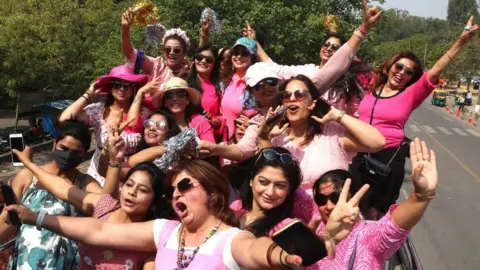 BBC
BBCYou might have seen International Women's Day mentioned in the media or heard friends talking about it.
But what is this day for? When is it? Is it a celebration or a protest? Is there an equivalent International Men's Day? And what events will take place this year?
For more than a century people around the world have been marking 8 March as a special day for women.
Read on to find out why.
1. How did it start?
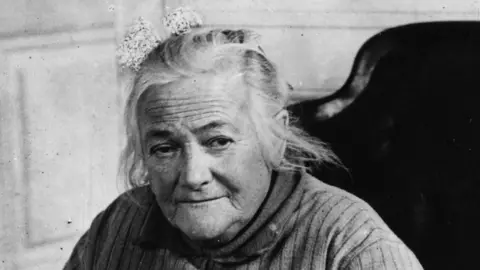 Corbis / Hulton Deutsch
Corbis / Hulton DeutschInternational Women's Day, also known as IWD for short, grew out of the labour movement to become an annual event recognised by the United Nations.
The seeds were planted in 1908, when 15,000 women marched through New York demanding shorter working hours, better pay and the right to vote. A year later, the Socialist Party of America declared the first National Woman's Day.
It was Clara Zetkin, a communist activist and advocate for women's rights, who suggested the creation of an international day. She put her idea to an International Conference of Working Women in Copenhagen in 1910 - and the 100 women there, from 17 countries, agreed to it unanimously.
International Women's Day was first celebrated in 1911, in Austria, Denmark, Germany and Switzerland. The centenary was celebrated in 2011, so this year we're technically celebrating the 111th.
Things were made official in 1975 when the United Nations started celebrating the day. The first theme adopted (in 1996) was "Celebrating the Past, Planning for the Future".
International Women's Day has become a date to celebrate how far women have come in society, politics and in economics, while the political roots of the day mean strikes and protests are organised to raise awareness of continued inequality.
2. Why 8 March?
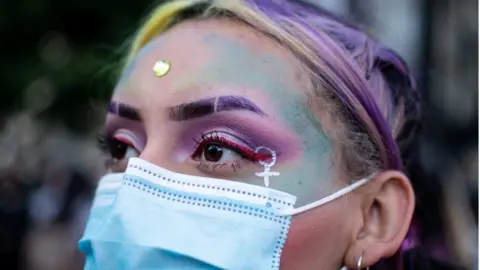 Getty Images
Getty ImagesClara's idea for an International Women's Day had no fixed date.
It wasn't formalised until a wartime strike in 1917, when Russian women demanded "bread and peace"; four days into the strike the tsar was forced to abdicate and the provisional government granted women the right to vote.
The strike began on 8 March and this became the date that International Women's Day is celebrated.
3. Why do people wear the colour purple?
 Getty Images
Getty ImagesPurple, green and white are the colours of IWD, according to the International Women's Day website.
"Purple signifies justice and dignity. Green symbolises hope. White represents purity, albeit a controversial concept. The colours originated from the Women's Social and Political Union (WSPU) in the UK in 1908," they say.
4. Is there an International Men's Day?
There is indeed, on 19 November.
But it has only been marked since the 1990s and isn't recognised by the UN. People celebrate it in more than 80 countries worldwide, including the UK.
The day celebrates "the positive value men bring to the world, their families and communities", according to the organisers, and aims to highlight positive role models, raise awareness of men's well-being, and improve gender relations. The theme for 2021 was Better relations between men and women.
5. How is Women's Day celebrated, and will there be virtual events this year?
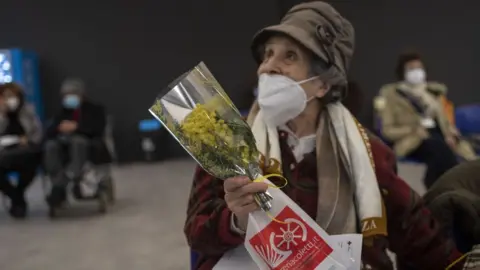 Getty Images
Getty ImagesInternational Women's Day is a national holiday in many countries, including Russia, where flower sales double during the three or four days around 8 March.
In China, many women are given a half-day off work on 8 March, as advised by the State Council.
In Italy, International Women's Day, or la Festa della Donna, is celebrated by the giving of mimosa blossoms. The origin of this tradition is unclear but it is believed to have started in Rome after World War Two.
In the US, the month of March is Women's History Month. A presidential proclamation issued every year honours the achievements of American women.
This year, celebrations will continue to look a little different because of coronavirus and virtual events are expected to take place around the world, including this one organised by the UN.
6. What is the IWD 2022 theme?
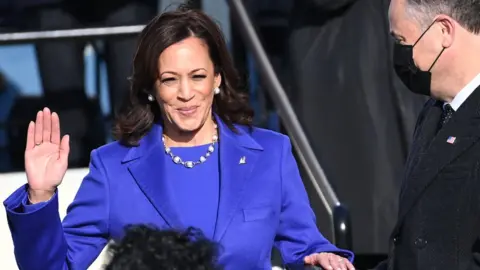 Getty Images
Getty ImagesThe UN announced their theme for 2022 as "Gender equality today for a sustainable tomorrow". Their events will recognise how women around the world are responding to climate change.
But there are also other themes around. The International Women's Day website - which says it's designed to "provide a platform to help forge positive change for women" - has chosen the theme #BreakTheBias and is asking people to imagine "a world free of bias, stereotypes, and discrimination".
7. Why do we need it?
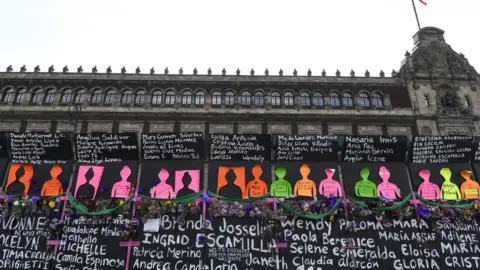 Getty Images
Getty ImagesWe have seen a significant step back in the global fight for women's rights over the past year. The resurgence of the Taliban in August changed the lives of millions of Afghan women - girls were banned from receiving secondary education, the ministry for women's affairs in the country was disbanded, and many women were told not to return to work.
In the UK, the murder of Sarah Everard by a serving police officer reignited debates around women's safety.
The coronavirus pandemic also continues to have an impact on women's rights. According to the World Economic Forum's Global Gender Gap Report 2021, the time needed to close the global gender gap has increased by a generation from 99.5 years to 135.6 years.
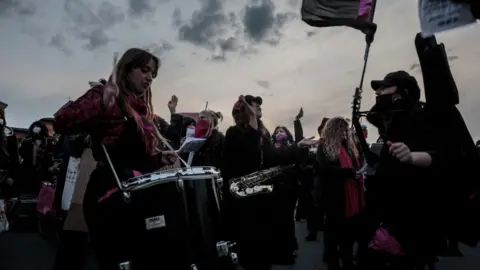 Getty Images
Getty ImagesA 2021 study by UN Women based on 13 countries showed that almost one in two women (45%) reported that they or a woman they know experienced a form of violence during the Covid-19 pandemic. This includes non-physical abuse, with verbal abuse and the denial of basic resources being the most commonly reported.
Despite concerns over coronavirus, marches took place around the world for IWD 2021.
In Mexico, women's groups turned metal fencing, erected to protect the National Palace, into an impromptu memorial for the victims of femicides.
Meanwhile, women in Poland held protests across the country following the introduction of a near-total ban on abortion in January 2021.
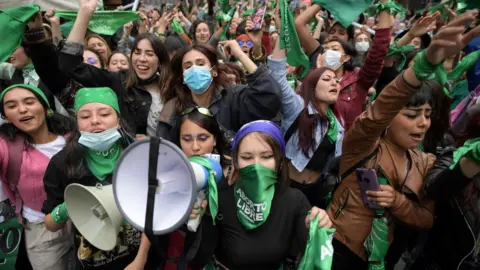 Getty Images
Getty ImagesIn the past few years though, there has been progress - especially in female leadership.
Kamala Harris became the first female, first black and first Asian-American US vice-president in 2021.
In the same year, Tanzania swore in its first female president, Samia Suluhu Hassan, while Estonia, Sweden, Samoa and Tunisia got female prime ministers for the first time in history. In January 2022, Xiomara Castro was sworn in as Honduras' first female president.
In 2021, New Zealand approved paid bereavement leave for women (and their partners) who have a miscarriage or stillbirth. While in 2020, Sudan criminalised female genital mutilation.
And who can forget the impact of the #MeToo conversation, speaking out against experiences of harassment and sexual assault? It began back in 2017 but is now a global phenomenon. In January 2022, a university lecturer in Morocco was sentenced to two years in prison for indecent behaviour, sexual harassment and violence after university students broke their silence about demands he had made for sexual favours in return for good grades - a string of such scandals have tarnished the reputation of Moroccan universities in recent years.
The last year has seen developments regarding abortion in several countries. In February 2022, Colombia decriminalised abortions within the first 24 weeks of pregnancy. In the US, meanwhile, abortion rights have been restricted in some states, with Texas banning procedures from as early as six weeks into a pregnancy.
We want to tell your story: YOUR International Women's Day
Tell us your plans for International Women's Day. Are there special events in your area? How are you planning to mark it? Will you be taking part in marches or protests? Do you have images you want to share? And, finally: why is it important for you? Tell us your story - one of our journalists may contact you soon.

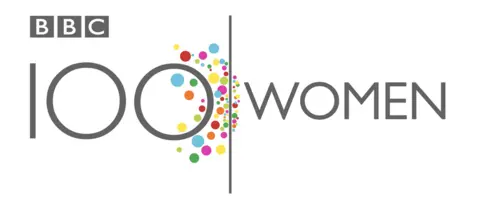
What is 100 Women?
BBC 100 Women names 100 inspiring and influential women around the world every year. Follow BBC 100 Women on Instagram, Facebook and Twitter. Join the conversation using #BBC100Women.
